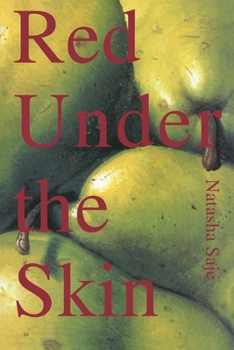Red Under The Skin
Winner of the 1995 Towson State University Prize for Literature and the 1993 Agnes Lynch Starrett Poetry Prize.
Format:Paperback
Language:English
ISBN:0822955458
ISBN13:9780822955450
Release Date:December 1994
Publisher:University of Pittsburgh Press
Length:88 Pages
Weight:0.35 lbs.
Dimensions:0.3" x 6.0" x 9.0"
Related Subjects
PoetryCustomer Reviews
3 ratings
Oral Tradition & Common Blood
Published by Thriftbooks.com User , 20 years ago
Red Under the Skin is compelling on many levels. First, there is the cover's red lettering against enlarged, multi-toned bodies of pears with stems that tempt one to pick them. The eye is drawn in, mind imagines biting into the skin, mouth remembers the taste of pear, tongue savors the memory of juice; all serve to escort my desire for words into the book. In this collection, the oral is the key to knowledge. The three "oral" themes-food, sex and language-are linked by "the persistence of desire" ("Rampion"). The reader is told, "information comes two ways, says Jung:/through our senses or our intuition."("Eating Crabs with Bob and Jim"). Clearly, these poems focus on the senses. What fascinates this reader is how our relationship to speech is described in terms usually reserved for food or sex: "No matter that some words glide over the tongue,/entice us with sweet stories,/we're still stuck/with their roots in our throats" ("Creation Story"). The narrator of "On a City Street" addresses the reader directly, asking, "Do the words enter you like blackberries/or someone else's breath?" What is not said is of central significance, and being silenced is a consistent theme, whether due to internal or external forces. There is the great challenge we all face in reflecting human experience through language-struggling for, being without words-or even not needing them: "She says it's too, too, too.../and can't find the words/for what it is."("Tongues"); "Sometimes they blurt their way to the tongue./Mostly they swirl, banging against the gold/in our teeth and the bone of our skulls" ("Things");"...the feeling you'll never find/words for, but you know/how to answer anyway" ("Body Language"). This collection repeatedly speaks to consequence, in terms of what is said or not said, to us and by us: "What our families didn't say...," "to not say, not us." ("What Difference Does It Make?"); "What were they told?/What the papers don't tell..." ("Red Under the Skin"); "How to speak without naming,/without letting the name blind us/without letting the name speak by itself." ("Red Under the Skin"); "...in between we'll seldom speak. And if/I wish for our lives to be different,/I will inhale that wish like oxygen" ("Mountains"); "calling up each word and waiting/to hear a voice on the other side,/hello, hello./The words hung up as soon as they heard her" ("Water Music"); "choosing what to tell, and censoring/the rest, the obsessions..." ("On a City Street"). Oral tradition as profound, formative, lasting experience is illustrated by the title poem when "the fiercest fighters" are described as those who return "to a land they knew only in the stories/of their parents." ("Red Under the Skin"). On a lighter note, consequences of the oral experience are detailed in "Dental Work," where the themes of food and desire are considered by a narrator who is silenced by her dentist's fingers and tools in her mouth! The relationship between being a woman and wor
Saje accomplishes something remarkable in the collection.
Published by Thriftbooks.com User , 27 years ago
Natasha Saje accomplishes something remarkable in this collection: she manages to elevate the personal to the universal, the sensual to the political. I know of no other collection of poems that is as successful in this way. She is truly an important voice.
Loved this book. It's exquisite.
Published by Thriftbooks.com User , 27 years ago
The title poem alone makes this book worth having. And it's only the beginning. Saje has an uncommonly sensual touch with language.





